 W
WAnd Chaos Died (1970) is a science fiction novel by American writer Joanna Russ, perhaps the genre's best-known feminist author. Its setting is a dystopian projection of modern society, in which Earth's population has continued to grow, with the effects somewhat mitigated by advanced technology. The novel was nominated for, but did not win, the 1970 Nebula Award.
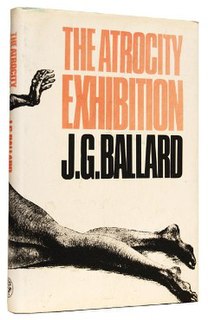 W
WThe Atrocity Exhibition is an experimental novel of linked stories or "condensed novels" by British writer J. G. Ballard.
 W
WChildren of Tomorrow is a 1970 science fiction novel by Canadian-American author A. E. van Vogt.
 W
WThe Daleth Effect, also known as In Our Hands, the Stars, is a science fiction novel written by Harry Harrison and published in 1970.
 W
WThe Dead Mountaineer's Hotel is a 1970 Soviet science fiction novel written by brothers Arkady and Boris Strugatsky. In 2015, Melville House published an English translation by Josh Billings as part of their Neversink Library collection. The novel heavily incorporates elements of detective fiction as it follows Inspector Peter Glebsky as he attempts to solve a classic locked-room mystery. However, the novel subverts common mystery novel tropes, and flouts the second of Ronald Knox's "Ten Commandments" of the detective genre:"All supernatural or preternatural agencies are ruled out as a matter of course."
 W
WDeryni Rising is a historical fantasy novel by American-born author Katherine Kurtz. It was first published by Ballantine Books as the nineteenth volume of the Ballantine Adult Fantasy series in August 1970, and was reprinted at least ten times over the next three decades. In 2004, the author released a revised and updated edition of the novel that was published by Ace Books. Deryni Rising was the first of Kurtz' Deryni novels to be published, though some of her later works served as prequels, detailing events that occurred before the time period of Deryni Rising. As a result, the storyline of the Childe Morgan Trilogy immediately precedes Deryni Rising, despite the fact that it was published over thirty years after the first novel.
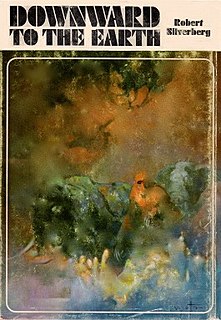 W
WDownward to the Earth is a 1970 science fiction novel by American writer Robert Silverberg. It is a tale of the quest for transcendence set on another planet, and includes references to Heart of Darkness, Joseph Conrad's classic tale of colonialism, including the name of Kurtz. Its title references Ecclesiastes 3:21 in the Bible.
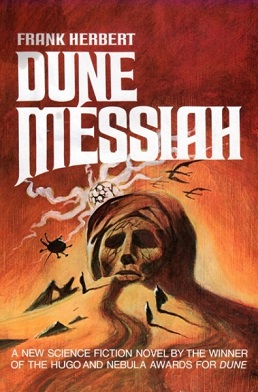 W
WDune Messiah is a science fiction novel by American writer Frank Herbert, the second in his Dune series of six novels. A sequel to Dune (1965), it was originally serialized in Galaxy magazine in 1969, and then published by Putnam the same year. Dune Messiah and its own sequel Children of Dune (1976) were collectively adapted by the Sci-Fi Channel in 2003 into a miniseries entitled Frank Herbert's Children of Dune.
 W
WThe God Beneath the Sea is a children's novel based on Greek mythology, written by Leon Garfield and Edward Blishen, illustrated by Charles Keeping, and published by Longman in 1970. It was awarded the annual Carnegie Medal and commended for the companion Greenaway Medal (Keeping) by the British Library Association. Pantheon Books published a U.S. edition with illustrations by Zevi Blum in 1971.
 W
WThe Guardians is a young-adult science fiction novel written by John Christopher and published by Hamilton in 1970.
 W
WI Will Fear No Evil is a science fiction novel by American writer Robert A. Heinlein, originally serialised in Galaxy and published in hardcover in 1970. The title is taken from Psalm 23:4.
 W
WThe Incredible Tide is a post-apocalyptic science fiction novel for young adults written by Alexander Key, published in 1970. It was the inspiration for the 1978 Japanese anime television series Future Boy Conan, directed by Hayao Miyazaki.
 W
WLord of the Trees is an American novel by Philip José Farmer. Originally released in 1970, it was one of two intertwining sequels to Farmer's previous A Feast Unknown, along with The Mad Goblin. Lord of the Trees features Lord Grandrith, an analogue of Tarzan, as the main character.
 W
WA Maze of Death is a 1970 science fiction novel by American writer Philip K. Dick. Like many of Dick's novels, it portrays what appears to be a drab and harsh off-world human colony and explores the difference between reality and perception. It is, however, one of his few to examine the human death instinct and capacity for murder and is one of his darkest novels.
 W
WOne Million Tomorrows is a science fiction novel by British writer Bob Shaw, first published in 1970 in magazine form by the American magazine Amazing Stories. The paperback version is somewhat different, and was published the same year by Ace Books, as illustrated by Leo and Diane Dillon.
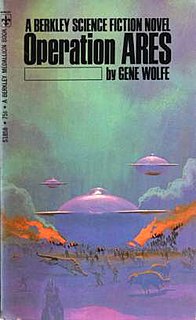 W
WOperation Ares is a science fiction novel by American writer Gene Wolfe, published as a paperback original by Berkley Books in 1970. It was his first novel. While no later editions were issued in the United States, a hardcover edition was released in the UK market by Dobson Books in 1977, followed by a Fontana paperback in 1978. The title is sometimes rendered Operation ARES.
 W
WOur Friends From Frolix 8 is a 1970 science fiction novel by American writer Philip K. Dick.
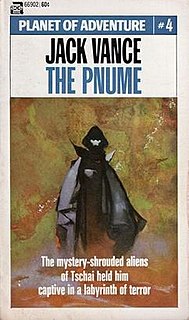 W
WThe Pnume is a science fiction adventure novel by American writer Jack Vance. The last book in the tetralogy of Planet of Adventure, it tells of the efforts to return to Earth by the sole survivor of a human starship destroyed while investigating a mysterious signal from the distant planet Tschai.
 W
WQuest for the Future is a science fiction novel by A. E. van Vogt. It was first published by Ace Books in 1970.
 W
WRingworld is a 1970 science fiction novel by Larry Niven, set in his Known Space universe and considered a classic of science fiction literature. Ringworld tells the story of Louis Wu and his companions on a mission to the Ringworld, a rotating wheel space station, an alien construct in space 186 million miles in diameter. Niven later added three sequel novels and then cowrote, with Edward M. Lerner, four prequels and a final sequel; the five latter novels constitute the Fleet of Worlds series. All the Ringworld novels tie into numerous other books set in Known Space. Ringworld won the Nebula Award in 1970, as well as both the Hugo Award and Locus Award in 1971.
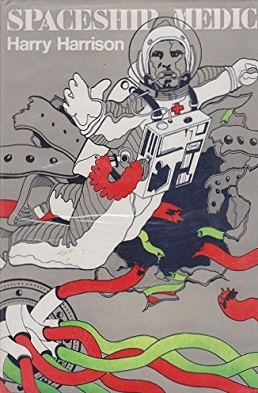 W
WSpaceship Medic is a 1970 science fiction novel for young people by Harry Harrison. The story originally appeared in the November 1969 issue of the magazine Venture Science Fiction as "Plague Ship".
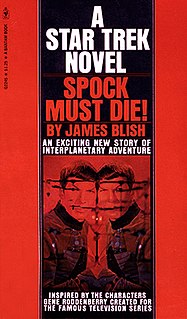 W
WSpock Must Die! is an American science fiction novel written by James Blish, published February 1970 by Bantam Books. It was the first original novel based on the Star Trek television series intended for adult readers. It was preceded by a tie-in comic book line published by Gold Key and the novel Mission to Horatius by Mack Reynolds, all intended for younger readers.
 W
WStar Light is a science fiction novel by American writer Hal Clement. It is the sequel to one of Clement's earlier books, Mission of Gravity. The novel was serialized in four parts in Analog Science Fiction/Science Fact Magazine from June to September 1970. Star Light was first published as a paperback book by Ballantine Books in September 1971.
 W
WThe Star Virus is the first science fiction novel by Barrington J. Bayley, expanded from a 1964 short story originally published in New Worlds. The plot centers on the attempts of humanity, the star virus of the title, to break through a barrier around the galaxy.
 W
WTau Zero is a hard science fiction novel by American writer Poul Anderson. The novel was based upon the short story "To Outlive Eternity" appearing in Galaxy Science Fiction in 1967. It was first published in book form in 1970. The book is a quintessential example of "hard sci-fi", as its plot is dominated by futuristic technology. It was nominated for the Hugo Award for Best Novel in 1971.
 W
WThis Perfect Day is a science fiction novel by American writer Ira Levin, about a technocratic dystopia. Levin won a Prometheus Award in 1992 for this novel. This Perfect Day is one of two Levin novels yet to be adapted to film.
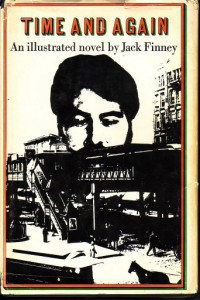 W
WTime and Again is a 1970 illustrated novel by American writer Jack Finney. The many illustrations in the book are real, though, as explained in an endnote, not all are from 1882, the year in which the main action of the book takes place.
 W
WTower of Glass is a science fiction novel by American writer Robert Silverberg, published in 1970. It was nominated for the Nebula Award in 1970, and for both the Hugo and Locus Awards in 1971.
 W
WTransmigration is a science fiction book by Scottish writer J. T. McIntosh, published in 1970.
 W
WWhipping Star is a 1970 science fiction novel by American writer Frank Herbert. It is the first full-length novel set in the ConSentiency universe established by Herbert in his short stories “A Matter of Traces” and “The Tactful Saboteur”.
 W
WThe Year of the Quiet Sun is a 1970 science fiction novel by American writer Wilson Tucker, dealing with the use of forward time travel to ascertain future political and social events. It won a retrospective John W. Campbell Memorial Award in 1976. It was also nominated for a Nebula Award for Best Novel in 1970, and a Hugo Award for Best Novel in 1971.